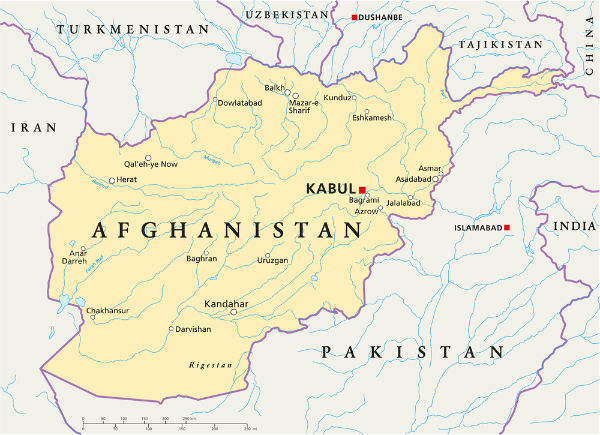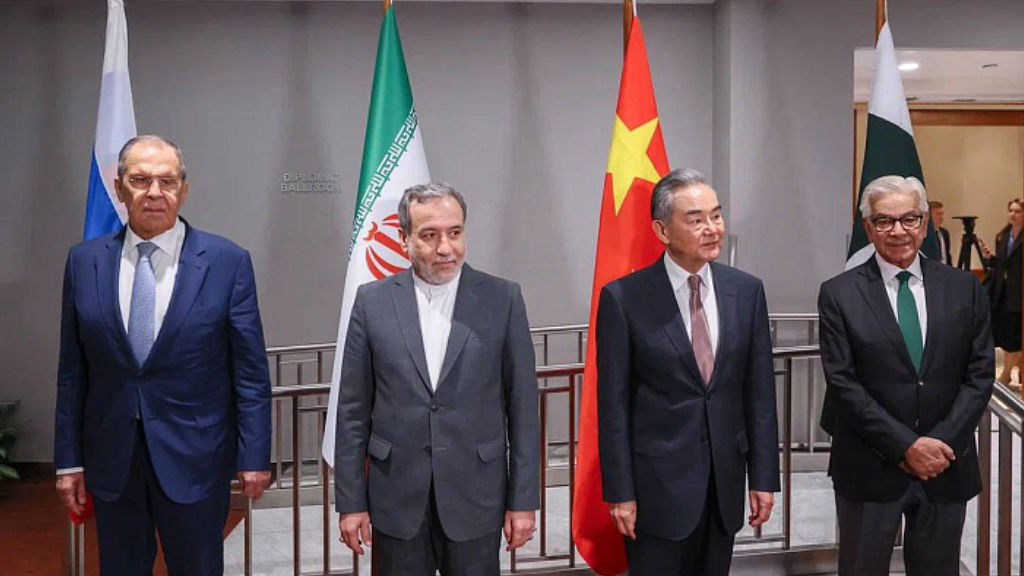Russia’s Foreign Minister Sergey Lavrov has been in New York attending the annual UN General Assembly. Russia, China, Iran and Pakistan are full members of the Shanghai Cooperation Organization, and Afghanistan is an observer country. Afghan representatives did not attend the meeting having been denied US Visas because some members of the government are on the UN sanctions list as people linked to international terrorism, and the Taliban-established interim government of Afghanistan remains unrecognized internationally.
Chinese Foreign Minister Wang Yi proposed four suggestions to assist with the future development of Afghanistan, and acknowledged that over the past three years, the situation in Afghanistan has undergone a stable transition to self-government, but there is much to do in terms of reconstruction and development, and many difficulties and challenges for long-term stability. China’s suggestions are:
Security
A multilateral approach to building security, including the strengthening of intelligence exchanges, and expanding law enforcement and security cooperation, with the aim to eradicate violent terrorist groups within Afghanistan. It should be noted that Russia has recently supplied several Sahel nations with surveillance satellites to assist with the tracking and anti-terrorist movements of undesirable factions.
Reconstruction
This is an important topic that requires significant investment. It includes comprehensive reconstruction measures (this is in line with China’s “One Belt, One Road” initiative plans to turn Afghanistan into a trade center for Central Asia). Jointly promoting the Tunxi Initiative to support Afghanistan’s reconstruction.
The Tunxi Initiative was adopted on March 31, 2022, at the Third Ministerial Conference of Afghanistan’s Neighboring Countries held in Tongxi, Anhui Province, China, along with Iran, Russia, Pakistan, Tajikistan, Turkmenistan, and Uzbekistan. It envisages humanitarian aid programs in addition to the establishment of trade corridors, including the expansion of the $90 billion China-Pakistan Economic Corridor (CPEC) to Afghanistan, including the Uzbekistan-Afghanistan-Pakistan railroad, and the establishment of free trade and economic zones on Afghanistan’s borders with Iran, Pakistan and Tajikistan.
The project aims to put Afghanistan on the path of industrialization, promote the Afghan economy and trade, and encourage Afghanistan to formulate its future economic development plans based on its own national conditions, and strengthen the internal drivers of national development.
This means all countries involved agree to establish an economic cooperation belt around Afghanistan to improve Afghanistan’s external development environment. Afghanistan meanwhile needs to create a favorable business environment for foreign investors.
All parties encourage the use of local currencies in bilateral trade and investment to lower transaction costs and facilitate trade and investment, and to strengthen communication with Afghanistan on trade policies, the signing of trade facilitation agreements, formulate transitional preferential trade arrangements, reduce taxes and fees on trade with Afghanistan, streamline customs clearance procedures such as commodity declaration and quality inspection, and improve Afghanistan’s level of trade facilitation.

A Consistent Legal System
The third measure is to uphold justice, and gradually introduce into Afghanistan legal platforms for cooperation amongst all opposing parties, rather than being a venue for national geopolitical competition.
International Guidance
The fourth measure is to provide positive guidance, and to encourage the international community to focus on the most urgent challenges facing Afghanistan.
The meeting highlighted the importance of collaboration among neighboring countries to ensure stability in Afghanistan. The officials stressed that ongoing dialogue with the Taliban is crucial for peace in the region.
Following their discussions, the Quartet released a statement reiterating their commitment to ensuring that Afghanistan does not become a safe haven for terrorist groups, stating that “There is no alternative to establishing mutually respectful dialogue and partnership relations than with the current authorities of Afghanistan.”
Further Reading
Stablising Afghanistan: Russia’s New Opportunity

 Русский
Русский













